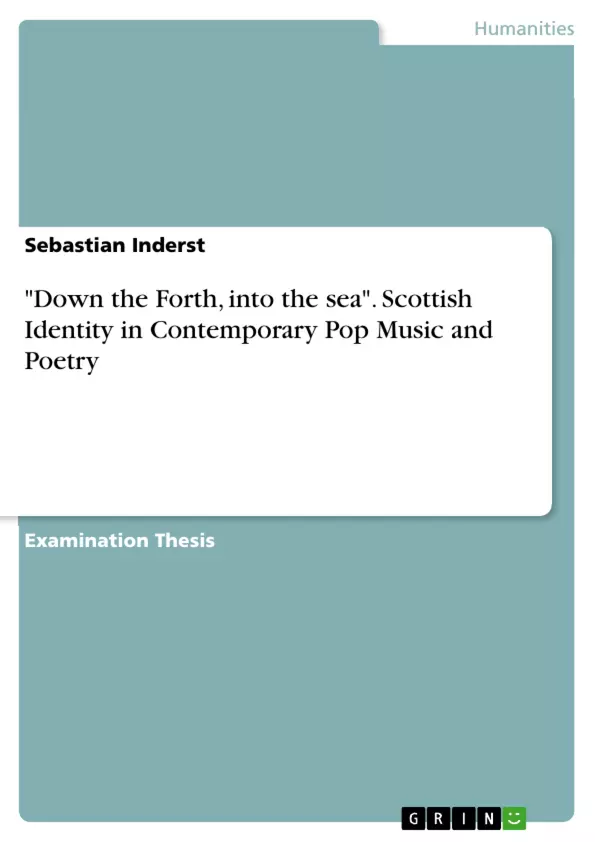This thesis is meant to illustrate and discover Scotland within contemporary poems and songs, and show how Scotland is portrayed today. There can not be a holistic view on Scottish poetry and music. Every day artists contribute to this vibrant art scene. The poems and songs in this thesis can therefore only be a tiny part of what is literature and music in Scotland. They are a small piece in a puzzle which is too big and ever-changing to be fully completed.
Scotland's current situation - politically, socioculturally, and geographically - is taken into consideration. A more detailed analysis of contemporary poems and songs will be provided thereafter. The thesis is based on personal interviews and emails with Scottish artists as well as scientific research. It is the result of personal reflection and intepretation from an outside perspective on artistic endeavour from Scotland.
Inhaltsverzeichnis (Table of Contents)
- A. Intro - "What is the Nation? Who is the Nation?"
- B. Scottish Identity in Contemporary Pop Music and Poetry
- B.1. "This is my House, this is my Home" - Scotland and the Scottish in the 21st Century
- B.2. “Waverley Steps\" - The Evolution of Music and Poetry
- B.3. \"Protect and Survive\" - Traditional Scottish Music today
- B.4. \"Who's got a Match?” - Devolution and Economy during the Thatcher years and thereafter
- B.4.1. Scotland the Brave?
- B.5. \"Say this to the quick stream: I am” - Identity and Scotland
- B.6. \"Cap in Hand”- Politics, Poetry and Music
- B.7. \"Why do Songs have Words?” - Contemporary Pop Music
- B.7.1. Pop Music in Scotland
- B.8. Muir/MacDiarmid/Morgan – The Evolution of Scottish 20th Century Poetry
- B.9. \"Throw the 'R' away\" - Language and Dialect
- B.10. \"The Modern Leper” - Existence, Loneliness, Alienation, Home
- B.11. “I came in from the Mountain - City vs. Countryside
- B.11.1. “The Glesga that I used to know”
- B.11.2. \"Taste the Coast”
- B.12. \"Why does it always rain on me?” - Scottish Weather
- B.13. The State of the Nation – The Poetry of Douglas Dunn and Kathleen Jamie
- B.14. Please explain your Poetry
- B.15. \"Ballads of the Book\" - The Collaboration of Music and Poetry
- C. Outro \"Scottish Winds\"
Zielsetzung und Themenschwerpunkte (Objectives and Key Themes)
This work examines Scottish identity in contemporary pop music and poetry. It explores how these mediums reflect and shape the cultural and political landscape of Scotland in the 21st century. The thesis analyzes the relationship between Scottish identity and issues such as devolution, the economy, and the political landscape. Key themes explored in the text include:- The evolution of Scottish identity in the 21st century
- The influence of traditional Scottish music and poetry on contemporary artists
- The role of language and dialect in defining Scottish identity
- The relationship between city and countryside in Scotland
- The impact of political and social changes on Scottish artists and their work
Zusammenfassung der Kapitel (Chapter Summaries)
The introductory chapter sets the scene for the exploration of Scottish identity, highlighting the historical and political context of the issue, including the upcoming referendum on Scottish independence. It examines how Scotland's political situation impacts its citizens and their artistic expression. Following chapters delve into specific aspects of Scottish identity as reflected in contemporary pop music and poetry. They analyze the evolution of both art forms, their relationship to traditional forms, and their responses to socio-political developments. These chapters also examine the roles of language, dialect, and location in shaping Scottish identity, exploring the interplay between urban and rural experiences, and the themes of alienation, loneliness, and home. Further chapters focus on the poetry of Douglas Dunn and Kathleen Jamie, examining their reflections on the state of the nation, and exploring the collaboration between music and poetry.Schlüsselwörter (Keywords)
Scottish identity, contemporary pop music, poetry, devolution, politics, language, dialect, city, countryside, alienation, home, Scotland, the United Kingdom, tradition, modernity, nation, nationalism, culture, art, music, poetry, identity, politics, language, dialect, city, countryside, alienation, home.Frequently Asked Questions
How is Scottish identity portrayed in contemporary music and poetry?
Contemporary Scottish artists reflect a vibrant, ever-changing identity that balances traditional roots with modern political and sociocultural realities like devolution and independence debates.
What role does language and dialect play in Scottish art?
Language and Scots dialects are crucial tools for defining identity, often used to express a sense of home, resistance to cultural homogenization, and local pride.
How did the Thatcher years influence Scottish culture?
The economic and political shifts during the Thatcher era sparked a strong sense of national consciousness and political dissent, which is frequently reflected in the lyrics and poems of that time.
Who are key figures in contemporary Scottish poetry?
The work of Douglas Dunn and Kathleen Jamie is central to understanding how modern poetry reflects the "state of the nation" and personal identity in Scotland.
Is there a collaboration between music and poetry in Scotland?
Yes, projects like "Ballads of the Book" highlight the strong tradition of collaboration between Scottish poets and pop musicians, merging literary and musical expression.
- Citar trabajo
- Sebastian Inderst (Autor), 2012, "Down the Forth, into the sea". Scottish Identity in Contemporary Pop Music and Poetry, Múnich, GRIN Verlag, https://www.grin.com/document/207172



